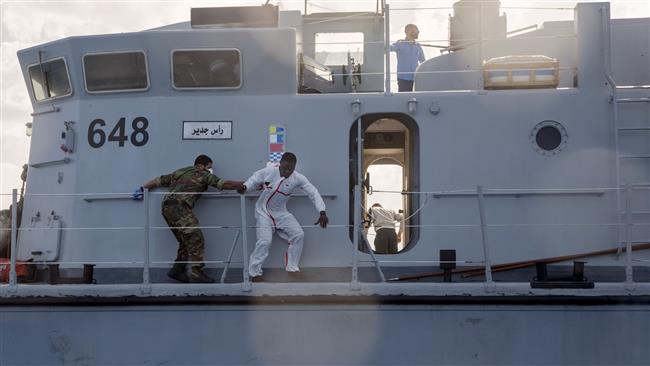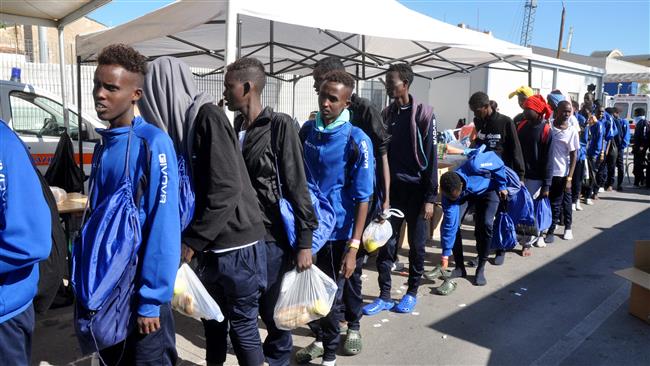EU helping Libya detain refugees inhuman: UN
The United Nations (UN)’s human rights chief says the European Union (EU)’s policy of helping Libyan officials intercept Europe-bound refugees and often detain them is “inhuman.”
“The suffering of migrants detained in Libya is an outrage to the conscience of humanity,” said the UN’s High Commissioner for Human Rights Zeid Ra’ad al-Hussein in a Tuesday statement.
“The European Union’s policy of assisting the Libyan coastguard to intercept and return migrants in the Mediterranean [is] inhuman,” he added.
The volatile North African nation, effectively run by competing militia groups, has remained a key transit hub for asylum-seekers from war-ravaged countries trying to reach Europe. Many have fallen victim to severe abuse in Libya at the hands of human traffickers as well as others benefiting from the chaos in the country.
Hussein said, “The detention system for migrants in Libya is broken beyond repair,” adding, “The international community cannot continue to turn a blind eye to the unimaginable horrors endured by migrants in Libya, and pretend that the situation can be remedied only by improving conditions in detention.”

Reacting to Hussein’s charges, an EU spokesperson agreed that the conditions at the refugee detention centers were “unacceptable” but said Brussels was funding UN agencies on the ground in Libya to protect people.
“We believe that the detention centers in Libya must be closed. The situation in these camps is unacceptable,” the spokesperson said in a statement, adding that the EU wanted the rescued people to be brought to “reception centers that meet international humanitarian standards” while also improving the Libyan coastguard’s capacity to prevent deaths at sea.
In his statement, however, Hussein criticized European governments for ignoring warnings that the cooperation with Libya could condemn more people to detention, exposing them to torture, rape, forced labor and extortion.
“We cannot be a silent witness to modern-day slavery, rape and other sexual violence, and unlawful killings, in the name of managing migration and preventing desperate and traumatized people from reaching Europe’s shores,” he said.
In early November, Libya’s Department of Combating Illegal Migration (DCIM) has said that it was holding 19,900 people in facilities under its control, up from nearly 7,000 in mid-September.
The sharp rise in detentions came after authorities took into custody thousands of people previously held by smugglers in Libya’s trafficking hub, Sabratha, west of Tripoli.
Hussein said UN staff members had visited four DCIM facilities earlier this month and were shocked by what they saw.
“[There were] thousands of emaciated and traumatized men, women and children piled on top of each other, locked up in hangars with no access to the most basic necessities, and stripped of their human dignity,” he said.
People, including children, described horrific beatings by guards at detention centers, while many women said they faced rape and other sexual violence at the hands of smugglers and guards, according to the UN staff.
One woman told UN staff she was gang-raped by three men, including a DCIM guard, while another woman said four armed men had gang-raped her during her journey, when she was pregnant.
“The increasing interventions of the EU and its member states have done nothing so far to reduce the level of abuses suffered by migrants,” Hussein underlined, saying that instead, there appeared to be a “fast deterioration in their situation in Libya.”
‘Abhorrent’: Oxfam says only 12 trucks delivered aid in North Gaza since Oct.
VIDEO | Leader receives religious eulogists on Hazrat Fatima birth anniv.
Pope Francis slams Israel’s ‘machine-gunning’ of Gaza children
US hostage-taking of Iranian nationals violation of intl. law: Deputy FM
VIDEO | Carol Singers for Palestine on London’s Parliament Square
Israel powerless in confronting Yemen’s strikes: Ansarullah
VIDEO | Yemenis praise the military for its successful operations against Israel
VIDEO | Israel continues to bomb Gaza homes













 This makes it easy to access the Press TV website
This makes it easy to access the Press TV website